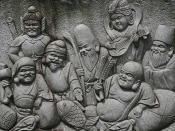In his dialogues concerning religion David Hume explores whether religious belief can be rational. Because Hume is an empiricist he thinks that a belief is rational only if it is sufficiently supported by experiential evidence. So the question is really, is there enough evidence in the world to allow us to infer an infinitely good, wise, powerful, perfect God? Hume does not ask whether we can rationally prove that God exists, but rather whether we can rationally come to any conclusions about God's nature. Philo, the philosophical skeptic, believes that God is incomprehensible and Cleanthes argues the position that we can come to know about God by reasoning from the evidence afforded us by nature. Cleanthes bases his belief in God on the argument from design. According to this argument, the complex order and beauty of our universe can only be explained by positing the existence of an intelligent designer, that is, God.
The argument is supposed to work by way of analogy; the world resembles a finely tuned machine and all machines we know of are created by intelligence (human intelligence). Therefore, the world must also be caused by intelligence (divine intelligence). So by looking at nature, we obtain overwhelming evidence that God's intelligence resembles human intelligence but in a more perfect form. By showing that the argument from design fails, Hume hopes to prove that religious belief cannot possibly be based on reason.
Philo the skeptic delivers Hume's objections to the argument from design by attempting to demonstrate that the argument from design is faulty. The argument from design seems to be an argument by analogy, but it does not work under this particular case. First, the analogy between machines and the universe is weak at best, and as such any reasoning based on this analogy must...


